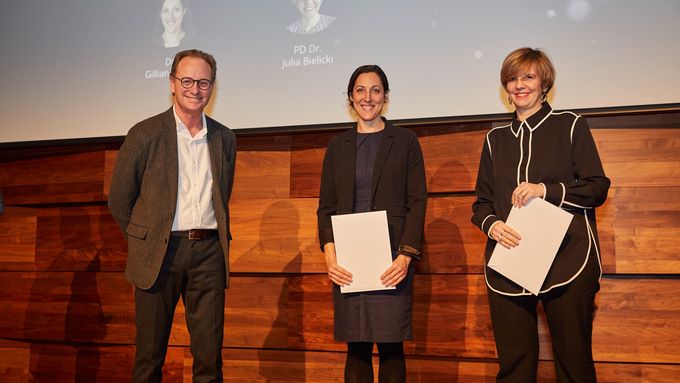Gillian Levine and Julia Bielicki receive Pfizer Research Award
30.01.2023
Excessive and unjustified use of antibiotics poses health risks and promotes antibiotic resistance. For children in low- and middle-income countries, there is a great need for action, as Julia Bielicki from the University Children's Hospital (UKBB) and Gillian Levine from the Swiss Tropical and Public Health Institute (Swiss TPH) show in a joint study. For their outstanding clinical research in pediatrics, the Basel scientists received the prestigious Pfizer Research Award 2023.

Gillian Levine from Swiss TPH (middle) and Julia Bielicki from UKBB (right) received the prestigious Pfizer Research Award 2023.
On 26 January 2023, Julia Bielicki and Gillian Levine were honored with the Pfizer Research Award in the Pediatrics category for their collaborative study on high exposure in children in low- and middle-income countries. The prize, worth 165,000 Swiss francs, has been awarded annually since 1992 and is considered one of the most prestigious research awards in the field of medicine. It honors young scientists working at Swiss research institutes or hospitals for outstanding and pioneering contributions to basic and clinical research. This year, eleven research projects were awarded the Pfizer Prize.
Excessive antibiotic use poses health risks and promotes antibiotic resistance
For children in low- and middle-income countries, there is a great need for action, as Gillian Levine from Swiss TPH and Julia Bielicki from the UKBB show in their joint study. Findings show that when used appropriately, antibiotics can save lives and prevent suffering in children, though when used excessively, the overuse of antibiotics contributes to increased antimicrobial resistance. Careful use of antibiotics is therefore of global interest to children's health.
As part of a joint study, Basel researchers Julia Bielicki, senior physician in pediatric infectious diseases at UKBB, and Gillian Levine, epidemiologist at Swiss TPH, shed more light on the situation. In 45 low- and middle-income countries, they analyzed how often children are treated with antibiotics during their first five years of life and under what circumstances. The conclusion is worrisome: children received an average treatment of 18.5 antibiotics, which was likely unwarranted in some cases.
"It was impressive to see the extent to which many children accessed antibiotics through informal sources of care, particularly in countries where other children still have difficult access to life-saving antibiotics," said Bielicki. An extreme example is the Democratic Republic of the Congo, where children receive an average of more than 38 antibiotic treatments in the first five years of life. On the other side of the spectrum is Niger, with only 3.7 treatments in the same lifetime.
"The findings point to a great need for action," said Levine. "Specific measures and tools are urgently needed to reduce inappropriate antibiotic use and improve access to appropriate treatment."
Contact

Gillian Levine
PhD, MPH, Dr.
Senior Scientific Collaborator
+41612848732
gillian.levine@swisstph.ch
Stay connected
Subscribe to our newsletter and get all the latest research news, project updates, course and event listings from Swiss TPH.